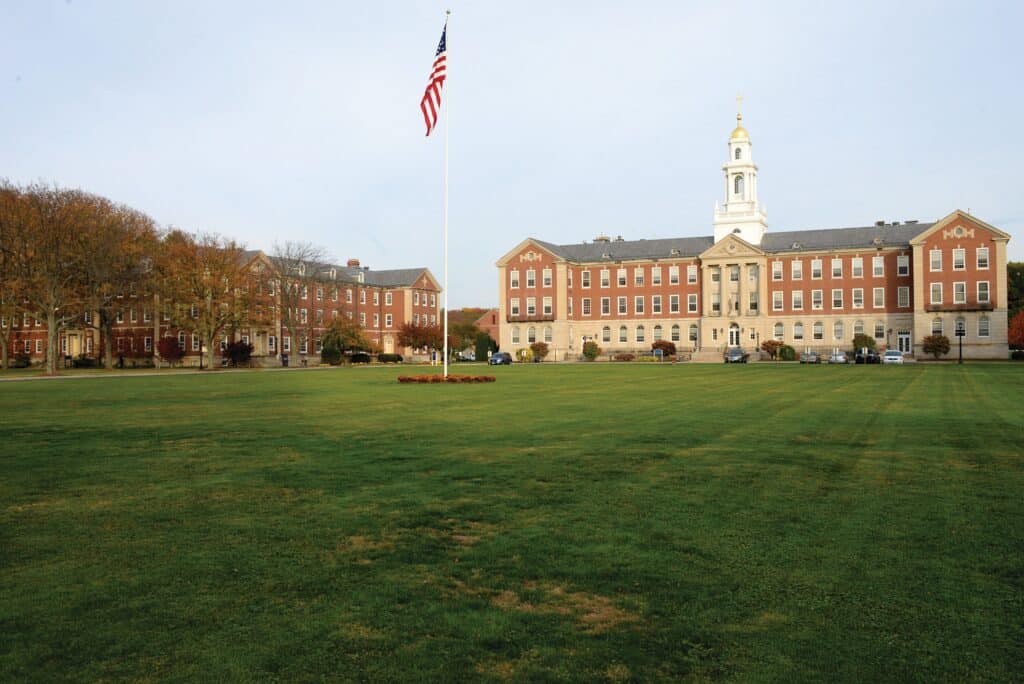What programs do you teach at the University of Saint Joseph? What drew you to this field of study? What keeps you excited about it?
I’ve been an instructor at the off-campus master’s program for the College of Education for 15 years. My courses are part of the special education and multiple intelligences/arts integration programs. I was a graduate student in the original off-campus program in 2005, during which I studied arts integration and Howard Gardner’s work. The coursework on how the brain learns and arts integration was so impactful that not only did it completely transform my teaching in my middle school teaching position, but I also wanted to teach future cohorts.
I received my undergraduate degree in special and elementary education with a minor in studio art from USJ. Go Blue Jays! My work as an adjunct instructor has led me on a doctoral journey to pursue a Ph.D. in Adult Education and Post-Secondary Learning. I am nearing the completion of my program and continually employ instructional strategies related to how adults learn in the courses I teach.
I absolutely love my work at USJ and have the privilege of interacting with the most amazing master’s candidates. When I start a new course, I get just as excited as I do about the first day of school in my full-time job as a public school teacher. I love the cohort model in the off-campus program and watch how learners come together as a small community of learners. Adults get to choose where they want to learn and how they want to learn. I am blessed to be a part of my learners’ goals to earn their master’s degrees and improve their pedagogical practices.
What attracted you to teach at the University of Saint Joseph? What sets them apart?
My affinity for USJ began during my undergraduate years while living on campus. I participated in a rigorous dual certification program that shaped my career in public education, starting as a special education teacher and later transitioning to teaching mathematics.
At 21, as a USJ graduate, I had gained a deeper understanding of my passions, the critical importance of embracing change and adaptability, and the confidence to be a strong, independent woman. After participating in the off-campus program, I immediately joined the teaching staff as a proud alumna to be a part of one of the best teaching and learning communities. USJ prepared me to be a highly effective practitioner, setting it apart from other graduate programs.
What is your professional background (including degrees) as an educator?
In addition to my bachelor’s degree and master’s coursework from USJ, I have a master’s degree in special education from Central Connecticut State University. I have been employed by Middletown Public Schools for almost thirty years, having served as a special education teacher and mathematics teacher at the middle school level. I am currently a secondary mathematics instructional coach working with teachers at the middle and high school levels.
Tell us a little about yourself. Why did you become interested in education?
I was not the child who knew she wanted to be a teacher at a young age. Although education was a core value in my family structure, having two parents, a grandmother, and an aunt all serving as educators, I wanted to grow up and use my gifts in art and design to become an architect. I spent countless hours drawing floor plans and dreaming of a career in design and problem-solving.
In high school, I struggled with mathematics. Later in life, I learned that I am a learner who processes information slowly. I felt I was always playing catch-up in mathematics classes and was repeatedly told by a high school geometry teacher that I would never be a successful architect.
Teachers have the incredible power to change the trajectory of a child’s life. It happened to me. I was devastated by the realization I had a trusted teacher in my life who did not believe in me or help me reach my goals and took me off a path I wanted throughout my childhood.
The summer before graduating from high school, I joined some friends to volunteer at a state-level Special Olympics competition and came home with the decision to pursue a program in special education.
At the core of my teaching philosophy is to always lift up children and embrace who they are and who they want to become. I became interested in education to help children on a positive trajectory in life.
What would you tell prospective students considering your programs about yourself? What’s something that students and colleagues should know about you?
I want to acknowledge the graduate program on multiple intelligences and arts integration. This program can sometimes be misunderstood by prospective students. As a former student and current instructor in the program, I encourage any prospective USJ graduate student, especially content area teachers, to consider broadening their pedagogical approaches.
My own teaching in my mathematics classroom underwent a profound transformation with coursework on how the brain learns and the importance of integrating visual arts, music, dance, storytelling, and theater. It is possible to sing, dance, and enjoy the Pythagorean Theorem! The arts should not be treated as supplemental to core areas of learning. It needs to be embraced in all classrooms.
Studying Howard Gardner’s work and his theory of multiple intelligences also changed my own definition of intelligence. My Ph.D. research focuses on using multiple intelligence-based instructional strategies with adult learners in higher education. As an instructor, I use a variety of strategies to engage all the intelligences of my learners. I approach each week’s classes with enthusiasm and joy!


